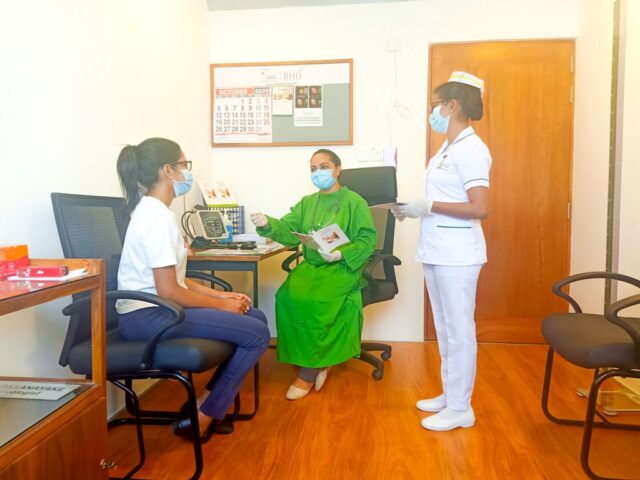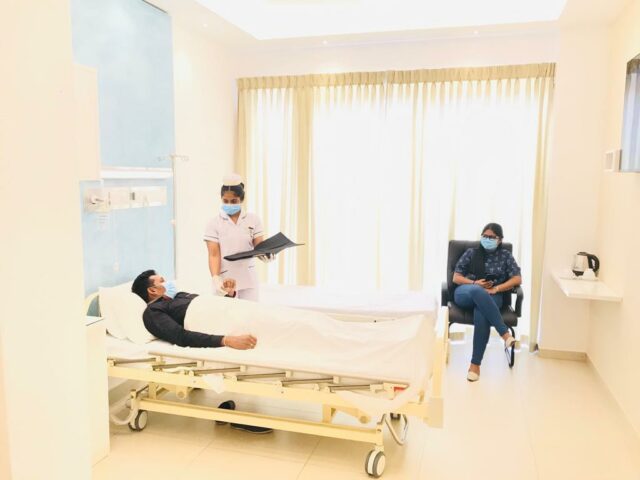Small and medium private hospitals play a critical role in Sri Lanka’s healthcare landscape. Over 90% of the registered 250 private hospitals in the country are SME hospitals. These hospitals cater to 60% of OPD treatment, provide health sector employment opportunities, and more importantly, ensure wide reaching access to quality healthcare.
As the country battles the COVID-19 pandemic, most SME Hospitals are facing their own hurdles that come with reduced footfall and extra costs related to the pandemic. This has led to a cash crunch, forcing some providers to scale back their businesses. Recent World Bank data from low and middle-income countries state that the pandemic’s stress is particularly acute for SME hospitals – such as solo practitioners, small hospitals, labs, and pharmacies – some of which may not survive the crisis without support.

SMEs role in COVID-19 efforts
With the highest cumulative cases in the Western Province, many small and medium hospitals like ‘Western Hospital’ have felt the heat of rising costs brought about by the pandemic. The hospital, which has been in operation for over 40 years is known for its treatment facilities for kidney disease, especially in dialysis and transplants.
“We are a hospital that used to cater to 2000 patients per month. Since the start of the pandemic we have seen a 40% reduction in footfall,” commented CEO of Western Hospital, Omar Sheriff.

“It has been a challenging time for many private hospitals, especially like ours, as many patients depend on kidney dialysis treatment. We do around 300 dialyses per month but assuming that one staff contracts COVID, the whole operation will come to a halt, which will, in turn, affect our patients,” he added.
Whilst following COVID-19 safety protocols and guidelines, the hospital has also transformed many of its rooms and nursing hostels into isolation units should they have to treat a suspected case. The hospital is also an authorized COVID-19 collection center.

“We have taken precautionary measures to ensure our staff are kept safe, but this comes at a very high cost. As our staff are also in the frontline, it would be great if the Government could assist SMEs by providing support in the form of providing PPE at a concessionary rate and, also assist with transporting COVID-19 positive patients from Private Hospitals to government treatment centers.”
“If we are to handle the pandemic effectively and provide quality healthcare across the board, we have to work to achieve the healthcare objectives laid out by the government. For example, our hospital is known for providing quality dialysis treatment. At present, the Government cannot handle the demand of those who are waiting in line to be treated. We, as a private entity can step in to provide affordable treatment”, he asserted.

Financial assistance and the dearth of skilled staff
In Awissawella, Gomez Private Hospital, like many SME hospitals, is faced with two major issues; coping with the high investments made on medical equipment and difficulty in finding skilled staff, especially during this COVID outbreak . As the pioneer private healthcare hospital in the area, at least 30-40% of the locality obtain medical services from Gomez Hospital.
“While we see an increase in demand for private healthcare, hospitals like ours are looking at ways to overcome the impact of COVID-19. When people say private hospitals, they always look at the few big hospitals. However, most of the private health sector consists of small and medium scale hospitals. But the support we give the national healthcare system goes unappreciated,” Managing Director and Director of Gomez Hospital, Dr. Sandamali Weerasinghe highlighted.

“Small and Medium-scale Hospitals give a personal touch in managing their patients, and most SME healthcare practices are developed by doctors who have been in the field for a long time. To continue to provide quality service, we need to have enough staff strength. This is another struggle. There is an overall gap in skilled workers in the private health sector, especially in the field of X-Ray, laboratory technicians, and specialized nurses” Dr. Weerasinghe noted.
“The future of private healthcare for SME hospitals is bright. We have noticed that even for smaller townships like Awissawella, the demand for private healthcare is growing. We need to be ready to cater to this demand post-COVID, but the SME Hospitals will need the Government’s assistance on this.”
Public-Private Partnerships are the way forward
In the Southern Coast of Galle, Ruhunu Hospital too is faced with challenges owing to the pandemic. Located in the Southern Province’s medical hub, the hospital is taking a financial blow with the reduction in footfall.
“Due to the pandemic, we have seen a significant decrease in channeling and in-house patients at our hospital. Despite this, we managed to retain our staff and continue to provide healthcare services,” CO – CEO of Ruhunu Hospital, Raveen Wickramasinghe noted.

Wickremesinghe said that the best way to harness SMEs’ potential in the healthcare system is through Public-Private Partnerships (PPPs) between the national and private healthcare practice and added that while Private Healthcare is a preferred option for primary and secondary care by patients, the Government should create opportunities to improve accessibility to receive tertiary care.
“There are times when hospitals like ours have unutilized resources. If there is a mechanism where we can work with the Government to offer some of our resources at a concessionary rate when public hospitals are running in full capacity. This will be another way to assist in taking the burden off from the public healthcare system and a mechanism to sustain private health system which has been hindered due to the pandemic.”
He further noted that the shortage of specialized medical equipment to treat illness like cancer must also be addressed.
“We can leverage on Public-Private Partnerships to work with agencies who are prepared to invest in healthcare infrastructure. There is a currently a shortage in availability of specialized machines like MRI and specialized diagnostic equipment.”
Finding the right balance
Operating on a slightly a different model to that of a traditional private healthcare institution, the story of the Co-operative Hospital in Kurunegala is rather different.
“We are currently working in full capacity with an average of 3000 patients, coming daily to receive treatment at our hospitals. We also provide training to nearly 100 nurses from across the country on a reasonable and easy payment scheme.” President of the Kurunegala Co-operative Hospital, Jayapathma Wanninayake said.
“At the start of the pandemic, some of our staff stopped coming to work due to the fear of contracting the virus. As time passed, we managed to pull through with the cadre that we have and have implemented all precautionary measures to safeguard everyone who walks through our doors.”

Being a Co-operative Hospital, Wanninayake said that the hospital’s main objective is to provide affordable treatment to Kurunegala residents, especially those living in rural parts of the district.
“There are currently 12 Co-operative hospitals across Sri Lanka, which follow a member-based business model; therefore, we work as a collective towards the benefit of those who cannot afford private healthcare. For example, our hospital gives a 40% discount for rooms to Co-operative members who are admitted for further treatment and a 20% discount on medicines. We currently have 50,000 members who benefit from this.”
There are times when the Kurunegala Teaching Hospital has sent their patients to us if they are unable to attend to them when there are strikes. We’ve also established several medical laboratories in areas that are difficult to access, like Wariyapola and Abanpola while also establishing mobile clinics to treat patients who cannot come to the hospital.”
Wanninayake noted that apart from granting free medical assistance during a disaster with the assistance of the hospital staff, many job opportunities have been created for people in the area, especially in nursing and as laboratory technicians.
Sustaining Small and Medium Private Hospitals
Small and medium-sized enterprises (SMEs) make up a large part of Sri Lanka’s economy, with over one million SMEs accounting for approximately 75% of all businesses, while contributing to 45% of total employment in Sri Lanka. Senior Assistant Secretary General of the Ceylon Chamber of Commerce (CCC) Chandrarathna Vithanage noted that this was among the pandemic’s hardest-hit sectors.
“While we saw the revenue of businesses take a plunge across different sectors, the most serious impact was felt by the SME sector. There was a survey of over 3,000 businesses by the Department of Labour last year, which found that more than 53% of SME operations had completely stopped while less than 5% were operating at full capacity and the balance operating under capacity,” Vithanage noted.
He added that this crucial period should be seen as an opportune moment to encourage Public-Private Partnership which would be important for the country’s economic recovery.
“We must understand that the SME sector is recognized as a game-changer for inclusive economic growth, regional development, employment generation, and poverty reduction. The distribution of SME hospitals is important to consider – they’re in semi-urban and rural areas. People from these areas are patronizing SME hospitals because it’s easier than visiting larger hospitals,” he noted.



